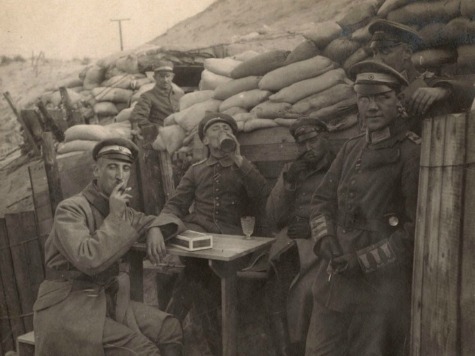
August 4, 2014 marks the 100 year anniversary of Germany’s military invasion of Belgium and the opening of the Western Front in WWI.
As the great German war machine mobilized and smashed into the low countries on a collision course with the French Republic, few knew just how devastating the war’s consequences would be. The Great War undoubtedly launched the “terrible twentieth century” as Winston Churchill called it.
After the assassination of Austrian Archduke Franz Ferdinand in Serbia on July 28, 1914, a chain of events plunged the European continent and the whole world into a bloody war that surpassed all others in previous history. Though the diplomatic establishments in each country attempted, often poorly, to keep mass war from breaking out, the militaries of the great powers sprung into action, mobilizing against each other.
Military leaders of the early 20th century were aware that victory in the age of machines and mass armies would require rapid mobilization and a quick concentration of power against the enemy. Once the armies had been sprung, there would be no turning back. German General and master strategist Count Alfred von Schlieffen had developed a brilliant but complicated plan to bring victory to Germany in a mass war on the European continent. It required knocking France quickly out of the conflict and swinging back to defend Germany from the Russian onslaught that would undoubtedly come in the East.
Schlieffen’s plan would require impeccable timing and it was critical that the German assault into Belgium and France not get bogged down.
Barbara Tuchman, in perhaps the greatest book on the early stages of WWI, The Guns of August, explained how the inertia of military mobilization overwhelmed German Kaiser Wilhelm on the eve of war.
Of Wilhelm, Tuchman wrote:
He wanted greater power, greater prestige, above all more authority in the world’s affairs for Germany but he preferred to obtain them by frightening rather than by fighting other nations. He wanted the gladiator’s rewards without the battle, and whenever the prospect of battle came too close, as at Algeciras and Agadir, he shrank.
However, it became clear by August that war was inevitable. A panicked Wilhelm tried to push the military establishment, and his top general, Helmuth von Moltke the Younger, into demobilizing the Western front and moving to the East to defend against a possible Russian invasion. But Moltke tersely rejected the idea and made it clear that the war was out of the Kaiser’s hands.
According to Tuchman, Moltke told the Kaiser, “Your Majesty it cannot be done. The deployment of millions cannot be improvised. If your majesty insists on leading the whole army to the East it will not be an army ready for battle but a disorganized mob or armed men with no arrangements for supply.”
So the German army plowed into Belgium, meeting valiant and fierce, but ultimately hopeless opposition from the tiny Belgium army. Eventually the Germans smashed into the French army and the British Expeditionary Force (BEF) that rushed to France’s aid. During the entire month of August the German army had the British and French allies on their heels.
German strategy had been to concentrate force and move quickly to cut the French and British lines apart to destroy the pieces separately. French General Joseph Joffre’s strategy, however, would be quite different. Instead of concentrating mass force, the French and British allied line would be spread out with a significant amount of reserves held back. The line would be anchored at the city of Verdun on the right flank. The BEF would be placed on the on the left flank, swinging around as the German army drove to Paris. Envision the French strategy as a bow being drawn back, being readied to fire. As long as the French and British line did not break, it would have a chance to snap back and launch a massive counteroffensive as supply lines grew shorter.
As the month of August passed and the beleaguered French and British armies took blow after blow, suffered retreat after retreat, and as the people of Paris could hear the roar of approaching German cannon fire in the distance, Joffre’s moment arrived.
Notified of a sudden gap in the German line by French General Joseph Gallieni, Joffre convinced British General John French that the moment to strike back had come. The First Battle of the Marne proved to be one of the most consequential in human history. Paris taxi drivers famously mobilized and brought fresh French troops to the front for the massive surge that sent the seemingly unstoppable German army reeling.
For all of Germany’s planning and success, all hopes of victory over the allied French and British powers had been lost, and the Western Front settled into the meat-grinder of trench warfare for the next four years. The dramatic month of August, in which it appeared that the incredibly ambitious Schlieffen Plan might succeed, ended without the ultimate prize of victory. In the end, four years of bloodletting and American entrance into the Great War would bring down the German Empire’s war effort and force them to sue for peace. The war that nobody had seen coming, that many thought impossible, finally ended after millions had died and the world’s civilizations had been thrown into turmoil.
As apocalyptic as the War to End All Wars seemed to be, we now know that it was merely the unfortunate prelude to the even more devastating war that followed less than a half century later.

COMMENTS
Please let us know if you're having issues with commenting.